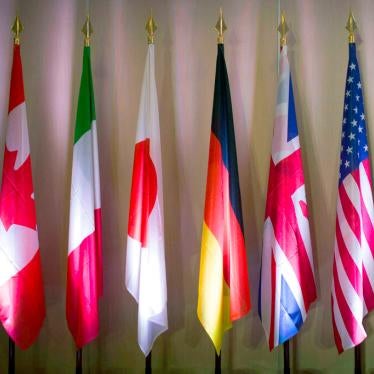With the annual meeting of the European Bank for Reconstruction and Development in Uzbekistan only days away, a crucial question remains: Will this high-level gathering serve to promote political and economic reform in the host country, or reward one of the most repressive governments in the region?
The Bank’s founding document gives it a mandate to promote development in those countries in the region that are committed to the “fundamental principles of multiparty democracy, the rule of law, human rights and market economics.” Uzbekistan satisfies none of these criteria.
The Bank has faced significant criticism for its decision to grant the Uzbek government the political prestige and financial benefit of hosting its annual meeting, attended each year by some 2000 finance ministers, government officials, bankers, and businesspeople. A broad campaign by non-governmental groups, launched a year ago by Human Rights Watch and over fifty partners, warned the EBRD that going ahead with the meeting without requiring any concessions in exchange would leave the Uzbek government to flag it as an endorsement of its repressive policies.
In fact, coverage of the upcoming meeting in Uzbekistan’s government-controlled media has cast it just as anyone even remotely familiar with authoritarian regimes would have expected. A March 18 television broadcast by “Akhborot” told Uzbek viewers that “[t]he EBRD does not cooperate with just any country because it sets it own conditions of principle, and a country wishing to receive financial aid from the organization should accept them…. Fruitful cooperation between Uzbekistan and the EBRD shows that Uzbekistan has gained a great deal of trust in this respect. Another important point is that the forthcoming annual meeting of the Board of Governors of the EBRD will be held in Tashkent. This fact is further proof that Uzbekistan’s prestige on the international arena is growing….”
Concern that the Tashkent meeting might prove counterproductive has been echoed by many voices in the international community. In separate statements issued during the past year, the Council of Europe Parliamentary Assembly, the U.S. Senate, and the E.U. following its January Cooperation Council meeting with Uzbekistan all emphasized the importance of seeing progress in Uzbekistan prior to the May 2003 meeting.
The Bank has proven reluctant to heed these calls and press for specific reform in advance of the meeting. Its President, Jean Lemierre, has repeatedly emphasized that the meeting is “not an endorsement,” but “an incentive to make progress.” Yet the Bank has failed to translate this statement of principle into a requirement of practical steps toward reform before the meeting convenes. As a result, the Bank has lost valuable time and squandered much of the leverage for reform it had. In just the past twelve months, while Bank officials dithered about linking the meeting to reform, at least eight prisoners were killed, apparently from torture, and seven human rights defenders were detained for peacefully promoting reform.
If the upcoming meeting is to have any positive impact on the political and economic development of Uzbekistan, it is now incumbent upon the Bank and its shareholder governments to use the meeting to identify specific reforms expected as a condition of further engagement, and after the meeting is over, to monitor and insist upon Uzbekistan’s compliance.
During the meeting itself, the key moment will be the opening session of the Board of Governors’ meeting, when the Bank’s president, followed by a senior representative of each shareholder government – usually the minister of finance, or equivalent – delivers a speech. Each shareholder government’s statement should send a strong signal to the host government, and the public at large – not least representatives from Uzbek civil society who will be listening carefully – about the significance the Bank’s decision-makers attach to the respect for human rights and democracy as part of their engagement.
Governors’ speeches should reiterate the benchmarks for reform identified in the Bank’s recently adopted country strategy for Uzbekistan and question the Uzbek government on the progress it has made in meeting them. They should address restrictions imposed on the operation of civil society groups and inquire about the reasons why most Uzbek human rights NGOs attending the meeting, such as the Human Rights Society of Uzbekistan, Mazlum, and the Committee of Legal Assistance to Prisoners, remain “illegal.” They should express concern about the arrests of seven human rights defenders in 2002 alone, including the forcible detention of Elena Urlaeva in a closed psychiatric ward in Tashkent. They should call for the release of those arbitrarily detained human rights defenders who remain in prison, including Tursunbai Utamuratov, Jura Muradov, Musulmankul Khamraev, and Norpulat Rajapov, and deplore these defenders’ absence from the meeting.
Governors should further ask about the estimated 6,500 religious and political prisoners serving lengthy sentences in Uzbekistan’s prisons, where torture is rampant and disease rife. They should not fail to note the conclusion by Theo van Boven, the U.N. Special Rapporteur on Torture, that torture is “systematic” in Uzbekistan, and call on the Uzbek government to implement his recommendations without delay. They should demand that what they have just said be accurately depicted in the local press, which continues to be subjected to strict government controls.
Prominent Finns have a leading role to play in highlighting human rights concerns in Uzbekistan at the meeting itself, and in ensuring adequate follow-up to rhetorical statements of commitment made by the international community in Tashkent. In March, Finland’s Under-Secretary of State for Economic Affairs, Johnny Åkerholm, was appointed Secretary General of the EBRD, and former President Martti Ahtisaari was named Special Envoy to Central Asia of the Chair-in-Office of the Organization for Security and Cooperation in Europe – the principal intergovernmental monitoring body on whom the EBRD relies for its political assessments.
Surely a forceful and unequivocal clarification of what drove the EBRD’s Board of Governors to give its stamp of approval to Tashkent as the venue of its upcoming annual meeting is warranted. Bank and shareholder government officials should emphasize that the choice of Tashkent is a test of Uzbek government will to reform, not a reward for current practices, before, during, and long after the meeting.
As for the Bank’s engagement more generally, there is a useful lesson to be learned from this experience: political and economic benefits serve as a more effective incentive for reform if linked to the required reform before being granted, rather than after the fact. That is, the Bank would almost certainly have achieved a lot more in terms of human rights improvements had it told the Uzbek authorities that it would be pleased to have them host one of its annual meetings as soon as their record on democracy and human rights met the standards required by the Bank’s founding principles, and not before. The Bank should simply have made clear that its founding document would not allow for a meeting in Tashkent until significant improvements could be seen in the Uzbek government’s human rights record. That would have been a real incentive for progress, with no risk of turning the exercise into an endorsement of existing, repressive policies.
With this course of action no longer an option, the Bank and its shareholders will have to redouble efforts to make the most of the leverage at hand. This entails being outspoken about human rights concerns at the meeting itself, and engaging in serious follow-up to ensure that pressure for reform will not relent after the meeting is over.







